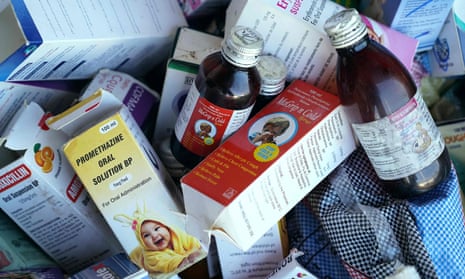India’s reputation as the “pharmacy of the developing world”, built assiduously by the country’s pharmaceutical companies since the time of the Aids epidemic, is in serious jeopardy. The World Health Organization (WHO) sounded the alarm last week when it said the deaths of 66 children in the Gambia could be linked to adulterated cough syrup manufactured by the Indian pharmaceutical company Maiden Pharmaceuticals.
Adulteration of cough syrup with diethylene glycol has been a known issue since 1937, when more than 100 Americans died after consuming a contaminated cough medicine manufactured by a US company. After that episode, most countries upgraded their regulatory standards to ensure mandatory testing of chemical solvents, such as propylene glycol, that are used in the manufacture of cough syrups. This was true even for India, yet the country has seen at least five instances of mass deaths linked to adulterated drugs since 1972. In one such event in 1998, in Gurgaon, a satellite city of Delhi, 33 children died after developing acute renal failure. In another, as recently as January 2020, contamination was believed to have been the cause of the deaths of 12 children in the northern state of Jammu. The common thread in these cases is what appears to be negligence on the part of the manufacturer for failing to test the chemical solvents for DEG contamination.
That Indian pharmaceutical companies have an abysmal track record in following good manufacturing practice (GMP) is the worst-kept secret of the global pharmaceutical industry. This first came to public notice when the US Food and Drug Administration (USFDA) began a sweeping criminal investigation in 2007 into the manufacturing practices at Ranbaxy Laboratories, India’s largest pharmaceutical company at the time. This was after Dinesh Thakur, co-author of this piece, who was an employee at Ranbaxy, turned whistleblower and informed the USFDA of serious quality-related issues at the company.
The USFDA inspectors discovered shocking disregard for GMP compliance at Ranbaxy’s manufacturing facilities in India that were exporting medicines to the US and Europe. As the USFDA ramped up investigations, it discovered a pattern of data fabrication across the Indian industry and began to block company after company from exporting to the US. A similar pattern of fraud was uncovered both by US and European regulators at clinical research organisations that generate the data required for the approval of drugs. One such “data integrity” scandal in 2014 led to the European Medical Agency recommending the suspension of marketing for 700 drugs. It is possible that some of the data fabrication was attributable to poor training and management practices, but a majority of it was probably guided by financial motives.
The response of the Indian government to these cases has been, first, to minimise the problem as a mere documentation issue and, second, to paint the actions of foreign regulators as a conspiracy by foreign pharmaceutical firms to defame competitive Indian companies. In 2013, after Ranbaxy pleaded guilty before an American court to seven counts of criminal felony and agreed to pay penalties to the tune of $500m (£445m), the Indian Ministry of Commerce put out a press release claiming that “vested interests” were raking up “isolated issues” about manufacturing quality in India.
However, the Americans and Europeans were not the only ones complaining about the quality of Indian pharmaceutical exports. In 2014, Vietnam blacklisted 45 Indian pharmaceutical companies and followed that up by blacklisting another 39 in 2016. Sri Lanka, Ghana, Nigeria and Mozambique have all complained about the quality of Indian drug exports. Closer to home, there are thousands of cases of drugs failing quality tests in Indian government laboratories. This is documented in official records.
A database hosted by the Indian government lists more than 8,000 drugs that failed quality tests, ranging from not having enough of an active pharmaceutical ingredient to the presence of bacterial endotoxins, and to glass particles in drugs meant to be injected. Not all these defects would cause deaths but they could lead to severe health issues, including anti-microbial resistance. This is one of the more worrying problems because we have seen cases where antibiotics have been found to have between just 12% and 40% of the active ingredient advertised on the labelling.
Yet when critics like us speak up, we are branded “anti-national”, the preferred epithet in Modi’s India. If the government of India remains in denial over the magnitude of the problem, India will lose its halo of being the developing world’s pharmacy, and the world will suffer broader consequences, such as anti-microbial resistance. The world must act now and shake the government out of its denial and stupor.
The writers are co-authors of the recently published book Truth Pill: The Myth of Drug Regulation in India (published by Simon & Schuster India)
